 Petzlover
Petzlover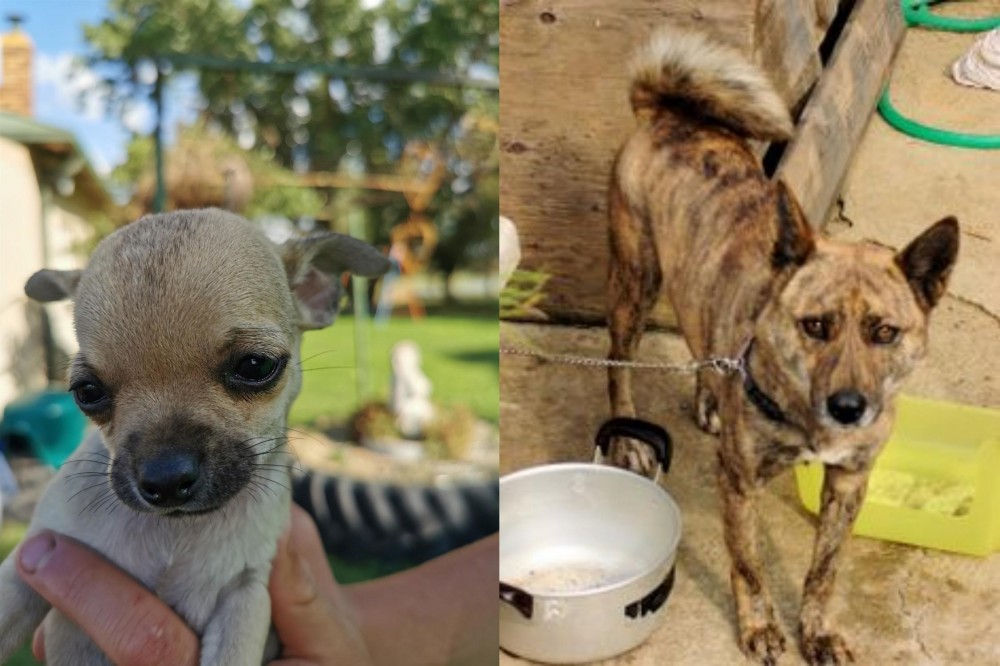 Chihuahua is originated from Mexico but Ryukyu Inu is originated from Japan. Chihuahua may grow 27 cm / 10 inches shorter than Ryukyu Inu. Chihuahua may weigh 21 kg / 46 pounds lesser than Ryukyu Inu. Chihuahua may live 8 years more than Ryukyu Inu. Chihuahua may have less litter size than Ryukyu Inu. Both Chihuahua and Ryukyu Inu requires Low Maintenance.
Chihuahua is originated from Mexico but Ryukyu Inu is originated from Japan. Chihuahua may grow 27 cm / 10 inches shorter than Ryukyu Inu. Chihuahua may weigh 21 kg / 46 pounds lesser than Ryukyu Inu. Chihuahua may live 8 years more than Ryukyu Inu. Chihuahua may have less litter size than Ryukyu Inu. Both Chihuahua and Ryukyu Inu requires Low Maintenance.
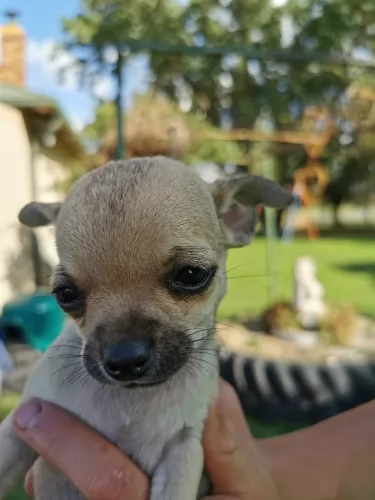 Quite a bit of the Chihuahua’s history is shrouded in mystery, and there are different versions about its origins.
Quite a bit of the Chihuahua’s history is shrouded in mystery, and there are different versions about its origins.
While historians speculate, most will agree that the tiny dog hails from Mexico. The UK Kennel Club considers the smooth- and long coat Chihuahuas as 2 distinct breeds.It was in 1904 that the Chihuahua became a registered breed by the American Kennel Club.
Chihuahua is actually the name of a state in Mexico, and it is amazing that Chihuahua specimens were found way back in the 1800's already. Today the Chihuahua is a very popular dog breed in several countries.
 The Ryukyu Inu is a medium-sized dog that comes from Okinawa, Japan.
The Ryukyu Inu is a medium-sized dog that comes from Okinawa, Japan.
It’s a dog that is fairly rare having been used to track boar. There isn’t much information on the dog’s history but after its numbers declined after World War II, there was an urge in the 1980s to save the breed.
The dog isn’t recognized by any major Kennel Clubs.
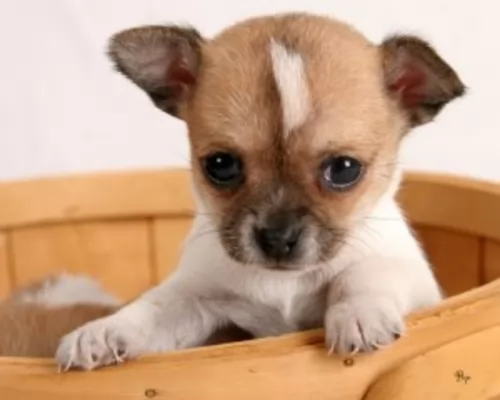 The small Chihuahua stands at about 15 – 23 cm and he weighs about 1,5 – 4kg.
The small Chihuahua stands at about 15 – 23 cm and he weighs about 1,5 – 4kg.
You’ll notice that he shivers when he is excited or when he is cold or frightened. Some people buy him a jersey to don on cooler days. With this tiny toy dog, you get a short- and a long coated Chihuahua.
This is the smallest dog breed and his coat is available in a number of colors such as fawn, tan, white and black. It is the dog’s round apple-shaped head which is a distinctive feature. He has erect ears and huge fruit-bat type eyes.
The Chihuahua is such an alert, fun-loving, feisty little dog, and though he may appear to be an ideal pet for children, he actually isn’t. He is too dainty and frail, and a child, during play, could accidentally crush him.
It’s a pity though because he just loves being around his human family. He is also a highly strung dog, and given the chance, he’ll nip and even bite during games. It is why socialization and training are considered important for the Chihuahua.
Just like with children, how you raise and treat your Chihuahua will determine how he turns out. He is such a sweet little dog that training and socialization can remove these unwanted characteristics. He is very intelligent and responds well to training.
 Japanese dog breeds end with the word ‘Inu’ or ‘Ken’ . It means ‘dog’.
Japanese dog breeds end with the word ‘Inu’ or ‘Ken’ . It means ‘dog’.
The medium sized Ryukyu Inu stands at between 46 to 50cm in height and weighs between 15 to 25kg. He has a black nose, dark brown eyes and erect ears. The tail is long and curls over the back.
The dog’s coat is short and you get the single- and double coated varieties. The coat can be brindle, red, white, liver or black. Some of the dogs have tiger-like stripes in the coat. People are amazed at these dogs as they have incredible climbing abilities and are even capable of climbing a tree.
These dogs are quiet, unobtrusive dogs. The Ryukyu Inu looks very much like a wild dog, which gives the impression of being un-trainable and ferocious but they are easily trained and make splendid pets.
Many people who have had them as pets say they would choose this dog over and over again. They are brave too and get on well with children or pets in the home. They don’t look for trouble, and their kind, stable natures make them excellent therapy dogs.
They’re intelligent dogs and will require plenty of mental and physical stimulation. They will also need to be trained and socialized as they are confident, strong-willed dogs who might not obey you if left to do what they want.
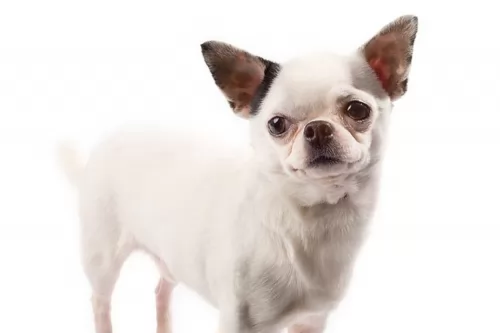 Small and feisty, the Chihuahua’s personality isn’t set in stone, and the tiny dog can be either shy and timid or he can be social, confident and jaunty.
Small and feisty, the Chihuahua’s personality isn’t set in stone, and the tiny dog can be either shy and timid or he can be social, confident and jaunty.
They're always loyal and affectionate to their human owners, but they don’t get on too well with- and are wary of small children who aren’t disciplined and who could hurt them.
With his big eyes and big ears together with his comical antics, they can be a source of entertainment for their human owners. He is easy to train too and even though he is small, he doesn’t think he is, and he is willing to use his big personality to make you a loving, loyal and devoted companion.
 This dog has always been a hunting dog so he will want to have his fair share of good exercise – long walks as well as ball and rope games.
This dog has always been a hunting dog so he will want to have his fair share of good exercise – long walks as well as ball and rope games.
He makes a splendid pet because he has an amicable nature wanting to please. He is quiet, loving and loyal, and with such a dog in your home and heart, you just keep discovering what a wonderful pet this 4-legged friend can be.
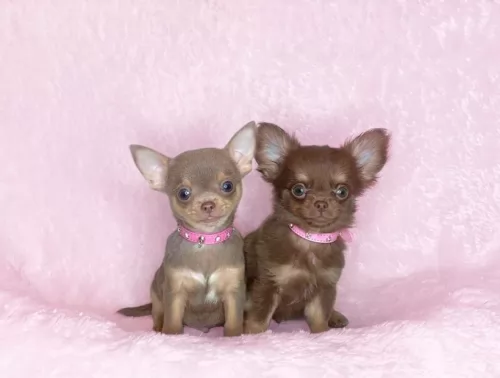 The Chihuahua doesn't have any particular health issues, more so when you get him from a reputable breeder. With good care he can reach 20 years of age.
The Chihuahua doesn't have any particular health issues, more so when you get him from a reputable breeder. With good care he can reach 20 years of age.
Known as low blood sugar, hypoglycemia is easily treatable, but if it isn’t caught early it can be fatal.Hypoglycemia makes a dog lethargic and he’ll shiver and could go into a coma. Get him to the vet immediately.
Gastric Dilatation or bloat is when the stomach twists, it becomes enlarged and blood supply is cut off to the stomach. Left untreated, it can be fatal.
Chihuahuas are susceptible to dental problems, so you will need to brush his teeth 2 or 3 times a week to prevent tartar build-up, gum disease, loss of teeth and other diseases.
 These Japanese dogs are thought to be fairly healthy dogs, but like with most other dogs, you would need to be aware of hip dysplasia, bloat, caner and hypothyroidism.
These Japanese dogs are thought to be fairly healthy dogs, but like with most other dogs, you would need to be aware of hip dysplasia, bloat, caner and hypothyroidism.
The Ryukyu Inu, with its 10 to 12 years lifespan, will be prone to minor ailments, but with good care he is not likely to succumb to any of them.
Cataracts have a number of causes in dogs. This disease of the eye can occur at any age, and can develop over weeks or even years.
Cataracts can occur in just one eye or both eyes and a disease such as diabetes can bring on a cataract.
Good nutrition is important for a dog to build a strong immune system, and nutritional supplementation can certainly help to enhance lens health. Cataract surgery can be performed to remove the cataracts.
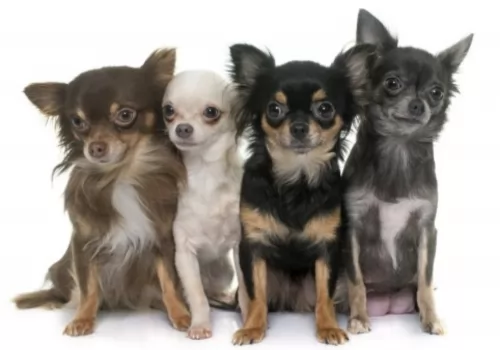 Always make sure to choose a high-quality dog food for your Chihuahua as this will keep him in tip-top health. A healthy Chihuahua can live to be 20 years of age. Speak to a veterinarian for recommendations on the best type of food to feed your tiny pet.
Always make sure to choose a high-quality dog food for your Chihuahua as this will keep him in tip-top health. A healthy Chihuahua can live to be 20 years of age. Speak to a veterinarian for recommendations on the best type of food to feed your tiny pet.
Giving him some home-made food such as brown rice, vegetables and cooked chicken for instance will be a welcome treat for him. Make sure he always has a bowl of fresh, cool water close by.
The Chihuahua may well be the smallest toy sized dog breed, but don’t be mistaken – he has plenty of energy and is constantly prancing around. He is more than capable of living in a small apartment, but even so he needs to be taken outside every now and then for a game or a walk.
Be careful with your small pet though, as too much exercise can lead to elbow- and hip dysplasia.
The Chihuahua is a moderate shedder with Spring being their heavier shedding period. Because of his small size, you won’t be bothered by too much hair. The short haired Chihuahua is easy to maintain and with a rubber brush, you can brush him gently twice a week.
You’ll also need to clip his nails and if you can’t manage this your vet can also help you.
 The coat of the Ryukya Inu requires brushing twice a week to remove loose hairs. At the same time check your dog over for new lumps and check inside his mouth for bad teeth. Bad teeth can cause lots of pain and toxins within the body. You can also choose to have the teeth seen to and cleaned by your vet.
The coat of the Ryukya Inu requires brushing twice a week to remove loose hairs. At the same time check your dog over for new lumps and check inside his mouth for bad teeth. Bad teeth can cause lots of pain and toxins within the body. You can also choose to have the teeth seen to and cleaned by your vet.
Provide him with his own warm, dry place to sleep.
Provide him with top quality food. There are some excellent commercially manufactured foods on the market that make a point of ensuring good ingredients in them. Your Ryukya Inu needs good food to ensure longevity and health.
Try to include some home-made food for him which can be simply mixed into the dry kibble twice a week. Boiled chicken, brown rice or pasta and spinach, sweet potatoes and carrots is super tasty and nutritious. This food can all be chopped up, refrigerated and added warmed up and in small portions to your pets dry kibble once or twice a week. Your dog will love it.
Ensure there is always a bowl of fresh, cool water within his reach.
Have him neutered or spayed if you aren’t wanting puppies.
Keep his vaccines up to date against some deadly canine diseases.
Get him to the vet when he is injured, in pain or sick.